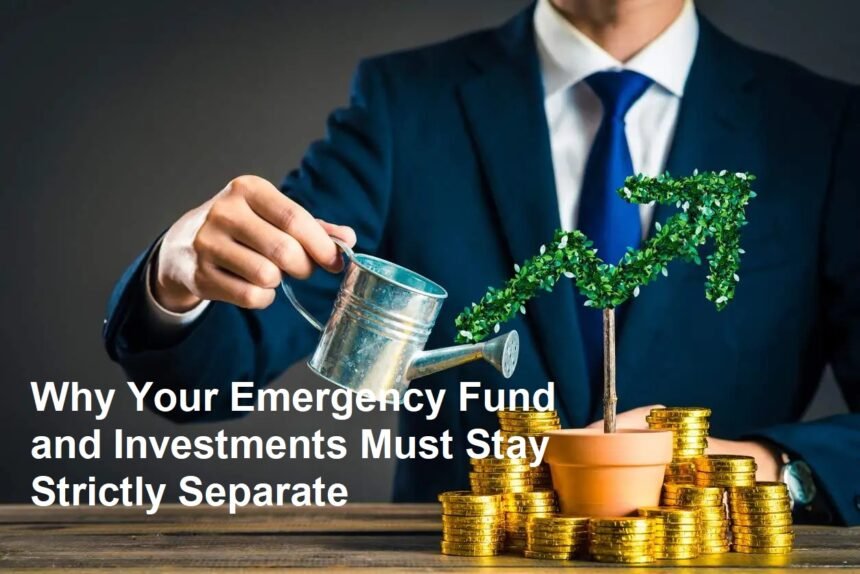Introduction
Merging your emergency fund with your investment portfolio might seem convenient – one less account to manage, right? However, this is a critical financial mistake that can undermine both your short-term security and long-term wealth. Keeping these two pots of money rigorously separate isn’t just good practice; it’s essential for sound financial health. Here’s why:
1. Fundamental Purpose Conflict: Safety Net vs. Growth Engine
- Emergency Fund:Its sole mission is to be your immediate, risk-free safety net. It exists to cover genuine, unexpected crises (job loss, major medical expense, urgent car/house repair) without forcing you into debt or derailing your financial plan. Its core requirements are liquidity (instant access) and capital preservation (zero risk to the principal).
- Investment Fund:Its purpose is long-term wealth growth. It requires accepting calculated risk and market volatility to outpace inflation and achieve goals like retirement, education, or a home purchase. Its core requirement is growth potential, inherently involving the possibility of loss, especially in the short term.
Merging them blurs these vital distinctions, putting both functions at risk.
- The Liquidity Trap: When You Need Cash, Markets Might Be Down
Imagine needing $10,000 for a medical emergency right now. If that money is invested:- Market Timing Risk:The market could be experiencing a significant downturn. Selling investments during a crash locks in permanent losses.
- Selling Under Duress:Panic or urgency forces you to sell assets you would otherwise hold long-term, disrupting your carefully planned investment strategy and compounding losses.
- Potential Penalties/Fees:Selling certain investments (like retirement accounts before age 59.5) can incur hefty penalties and taxes, making the emergency even more costly.
A dedicated emergency fund in cash (HYSA) ensures the money is always there, instantly accessible, at full value, regardless of Wall Street’s mood.
- The Temptation Factor: Raiding Investments for Non-Emergencies
When funds are commingled or easily accessible within an investment account:- Blurred Lines:It becomes psychologically easier to justify dipping into “savings” for non-emergencies – a tempting vacation, a new gadget, or even a planned expense you failed to budget for.
- Erosion of Growth:Every dollar withdrawn prematurely is a dollar that loses decades of potential compounding growth. Stealing from your future self for today’s wants is devastating to long-term goals.
- Undermining Discipline:It weakens the crucial financial habit of distinguishing between wants and needs and respecting the sanctity of your long-term investment plan.
A physically separate emergency fund (in a different bank/brokerage) creates a crucial psychological barrier. Accessing it feels like a bigger deal, reserved only for true crises.
4. Optimizing Returns (Ironically Requires Separation)
- Emergency Fund Yields:High-Yield Savings Accounts (HYSAs) offer modest but guaranteed returns with full liquidity and FDIC insurance. Chasing higher yields for your emergency fund by investing it introduces unacceptable risk.
- Investment Fund Potential:Knowing your emergency safety net is solid allows you to invest your investment fund more appropriately for long-term growth. You can confidently allocate to potentially higher-returning (but more volatile) assets like stocks because you won’t be forced to sell them during a market dip for an emergency.
- Strategic Rebalancing:Keeping investments separate allows for clean rebalancing (selling appreciated assets, buying underweight ones) without worrying about accidentally spending your emergency buffer.
Separation allows each fund to operate optimally within its risk/return profile.
5. Clarity, Peace of Mind, and Accurate Tracking
- Clear Financial Picture:Separate accounts provide instant clarity. You know exactly how much you have immediately available for emergencies and how much is dedicated to future growth. No mental calculations or risk of overestimating available cash.
- Reduced Stress:Knowing your emergency fund is fully funded and instantly accessible provides profound peace of mind. You sleep better knowing a crisis won’t force you into debt or destroy your investments.
- Simpler Management:Tracking progress towards your emergency fund goal (e.g., 6 months of expenses) and your investment goals (e.g., retirement target) is far easier and more accurate with dedicated accounts.
How to Implement Strict Separation
- Physical Separation:Open a dedicated High-Yield Savings Account (HYSA) at a different financial institution than your main checking or brokerage accounts. Name it clearly (e.g., “EMERGENCY FUND – DO NOT TOUCH”).
- Automate Funding:Set up automatic transfers from your checking account to your HYSA emergency fund first, before any investment contributions. Treat it like a non-negotiable bill.
- Define “Emergency”:Write down what constitutes a true emergency (unexpected, essential, urgent). Refer to this list before accessing the fund.
- Replenish Religiously:If you use the fund, pause discretionary spending and non-essential investing until it’s fully restored. Rebuilding it is the immediate priority.
- Invest Only After the Safety Net:Only start or increase investing after your emergency fund target is fully met. Your investment contributions come from separate cash flow allocated specifically for that purpose.
Conclusion
Merging your emergency fund and investments is like storing your life raft in the engine room of your ship – when the storm hits (emergency), you might not be able to reach it quickly, and trying to get it could damage the engine (your investments). Keeping them strictly separate ensures your life raft (emergency fund) is always accessible, fully inflated, and ready on deck, while your engine (investments) can run optimally for the long voyage ahead. This clear separation protects you from immediate financial disaster, preserves your long-term wealth-building potential, and provides invaluable clarity and peace of mind. It’s a foundational pillar of prudent financial management.












